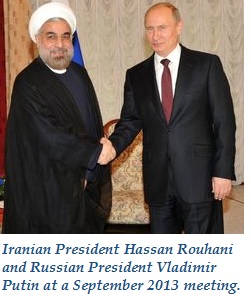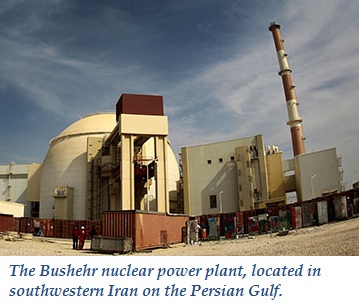Mark N. Katz
Iranian Foreign Minister Mohammad Javad Zarif will visit Russia on April 22 for a ministerial meeting of Caspian Sea countries. What is the status of relations between Tehran and Moscow?
 Moscow and Tehran have long appeared to have good relations but they are, in fact, often contentious. Iran values Russia’s role in tempering Western demands about its nuclear program and on other issues. At the same time, the Islamic Republic does not want to be drawn into defending Russia in the tense dispute over Ukraine, which pits Russia against the United States and Europe.
Moscow and Tehran have long appeared to have good relations but they are, in fact, often contentious. Iran values Russia’s role in tempering Western demands about its nuclear program and on other issues. At the same time, the Islamic Republic does not want to be drawn into defending Russia in the tense dispute over Ukraine, which pits Russia against the United States and Europe. Ironically, Moscow’s relations with Washington and the West today are worse than Tehran’s. Russia is actually concerned about losing influence in Iran, both because of President Hassan Rouhani’s more moderate tone on foreign policy and international tensions since the Crimea crisis erupted in February 2014.
On what issues do they collaborate? On what issues are they divided?
 Moscow and Tehran are often divided over the very issues on which they collaborate.
Moscow and Tehran are often divided over the very issues on which they collaborate. One of the biggest problems, for example, has been Iran’s first nuclear reactor at Bushehr. Russia was instrumental in completing the Bushehr reactor, but the long-delayed opening as well as numerous contract disputes became sources of tension.
Moscow has been helpful to Iran in delaying or limiting sanctions introduced by the West at the U.N. Security Council since 2006. But Tehran has also been annoyed that Russia voted to approve four resolutions that it could have vetoed.
Moscow has been an important arms supplier for Iran, but Tehran has been unhappy about the limits to cooperation. Tehran was furious in 2010 when Moscow canceled the S-300 air defense missile systems sold to Iran—even though Tehran had already paid for them.
 Moscow and Tehran have been especially divided over how to draw the maritime boundaries in the Caspian Sea, an issue that will be discussed during the April 22 ministerial meeting. Given the failure of past meetings to make progress, prospects for this round are no better.
Moscow and Tehran have been especially divided over how to draw the maritime boundaries in the Caspian Sea, an issue that will be discussed during the April 22 ministerial meeting. Given the failure of past meetings to make progress, prospects for this round are no better. One issue on which Moscow and Tehran have agreed is Syria. Both have supported the Assad regime’s campaign against the uprising launched in 2011.
What is Russia’s stance on Iran’s nuclear program? What role has it played in the latest rounds of diplomacy?
Moscow does not want Iran to acquire nuclear weapons, but it traditionally has not been as concerned as Washington. Moscow is far more concerned about maintaining and building Russia’s economic relationship with Tehran, especially in the area of petroleum, atomic energy and weaponry.
Moscow fears a nuclear accord will improve Iranian-American relations, and that Tehran may then have less need for Russia for trade or as an ally.
What is Iran’s stance on the unrest in Ukraine? And on Russia’s actions?
The Iranian reaction to events in Crimea and Ukraine has been mixed. Some Iranian leaders have complained that the West is bullying Russia, while others warned about the general dangers of separatism, an issue about which Iran also feels vulnerable. Iran did not show up for a vote at the United Nations on Resolution 68/39 declaring that the Crimea referendum in March about joining Russia was invalid. Iran was one of 24 states that was absent for the vote. Events in Ukraine are not central to Iranian foreign policy. Tehran certainly does not want the Ukrainian crisis to jeopardize nuclear negotiations with the world’s six major powers.
Has the Iran-Russia relationship changed since President Hassan Rouhani took office in August 2013? If so, how?
Before Rouhani’s election, Moscow hoped to play the role of mediator between Iran and the West, thus making Russia important for both sides. But the improved atmosphere between Iran and the West since Rouhani took office has lessened the need for Russian mediation. Even Iran and the United States can—and have had—direct talks with each other.
Mark N. Katz, professor of government and politics at George Mason University.
Click here for his chapter on Iran-Russia relations.
Photo credits: President.ir
